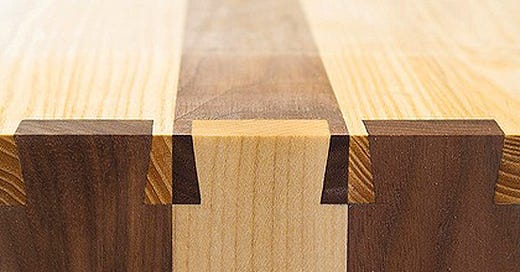Enjoying Failure
On why failing is important, how failure is a movable feast and how hard work pays off in the long run.
Apparently, a definition of madness is doing the same thing over and over again and expecting a different result. In order to not be seen as mad we change our routine, change tactics or try something different in order to get to the thing, whatever “the thing” happens to be; it could be getting a good grade on an exam, passing your driving test, getting a better job… delete as applicable.
To fail is human.
It’s normal. If we never failed, we’d never learn anything. Granted, some people found out the hard way that lighting a match inside a tent full of oxygen was a bad thing to do. For a very brief period of time, they knew that they’d failed. Shortly after that they were no longer concerned with failure, or anything at all for that matter.
To fail is to hopefully learn.
I have yet to cut a dovetail joint that I am happy with. My first one was entirely wrong. The pins were the wrong way, the tails were on the wrong piece of timber. There’s the argument that suggests “it’s not wrong, it’s just a different way of doing it”. No. The mechanics of joinery has rules tried and tested over centuries of development. What I had created was a failure in every respect imaginable, and that was fine.
Frustrating, but fine.
My second attempt… well the pins and tails were technically correct, but you could park a bus in the gaps. My third, was a little better but the gullets were so uneven it looked like a burgled graveyard. Forth one better, fifth one better again.
Through the frustration of the numerous times I’ve not even finished a practice piece and thrown it into the scrap bin comes knowledge and muscle memory. Eventually I’ll be able to do it. Making a dovetail joint that fits correctly isn’t some arcane dark art, it’s repetitive practice, understanding grain and respect of how different species of wood move seasonally.
Any idiot with a sharp chisel, a handsaw and a pencil can do it.
Failure only comes through desire and intent.
Don’t want to fail? Don’t try. Easy! If I don’t want to fail at making a dovetail joint, then the simplest shortcut is to never make one, but I do. I want to make a whole load of them because I want to be able to do it.
Practice makes perfect: bullshit. Practice makes progress.
I suppose the frustration of failure comes from trying to learn from a master without the intermediate steps. Looking at a Titian or Caravaggio hanging on the wall of a gallery, I can’t possibly imagine setting up an easel and bashing out something like that in an afternoon or a weekend or even a year because I haven’t picked up a paintbrush to paint a picture since play school. Time, practice, patience. I’m sure even a master craftsman, painter, musician still thinks “It’s good… but I could do better”.
I’m not suggesting that everything can be broiled down to a technical exercise.
Acting: Stand on this spot, repeat the words in the script to the other person or people.
Music: Press the right keys, or pluck the right string at the agreed time.
Photography: Turn the ring until the light waves are bent onto the focal plane and adjust your shutter speed and aperture until you get a correct meter reading, then push the button.
Woodwork: Take this tree, cut it into these dimensions and join them together with boiled horse bones.
Technically that’s all there is to it but it lacks intent. Soulless.
I was speaking with a friend recently who’s a theatre technician. You’d think that being a technician is a fairly binary task. Hit the cues for music, lights etc… but he said that while all it is is pressing buttons at the right time, there’s an art in it. When training new technicians he says he can see those that have flair, and those that don’t. There’s an art to pushing buttons… tiny unknowable nuances that make a scene transition, a lighting change, a music queue… just right. What that is? That’s the secret sauce.
It’s not really a secret, it’s knowing through experience.
Nothing is permanent, nothing is perfect, nothing is finished.
The Principals of Wabi-Sabi
Like my continuing pursuit of a well-fitting dovetail, I don’t think it will ever be perfect. Nothing is. Things are great, but there’s that voice in the back of the mind that says “it could be better”. I don’t believe that this is bad thing, it’s an affirmation that while now is good, there’s better to come. Failing at something doesn’t mean give up. To me is means try again.
Will anyone ever pay me to make them furniture? Unlikely.
Will anyone ever buy a print of my photography? Probably not.
Will anyone ever pay me to write about these things? Doubtful.
And none of that matters.
I have a job that I find reasonable. I pay the rent and the kings ransom that is the fuel bills at the moment. Food’s on the table, the house is warm. Those are the things that matter. I do these other things because my job requires me to sit at a desk for five days a week fixing peoples computer problems. Can I do that? Yes… Do I enjoy it? Not particularly. Woodwork and taking pictures and wittering on Substack for perhaps 8 people to read is a great escape from the drudgery of corrupted Adobe preferences or another broken projector unit.
So thank you for reading all the way to the end. I’m off to sharpen my chisel and have another go at making something better than the last one.




